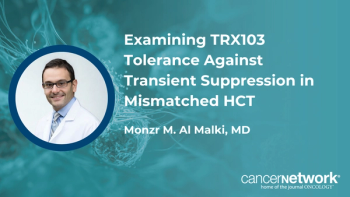
Promising Radioimmunotherapy Option for Some Lymphomas
A phase I/II study found that radioimmunotherapy with 177Lu and the anti-CD20 antibody rituximab along with the chelator DOTA is safe and feasible for treatment of relapsed follicular, mantle cell, or other indolent lymphomas.
A phase I/II study found that radioimmunotherapy with 177Lu and the anti-CD20 antibody rituximab along with the chelator DOTA is safe and feasible for treatment of relapsed follicular, mantle cell, or other indolent lymphomas.
“Radioimmunotherapy combines biologic and radiolytic mechanisms to destroy tumor cells,” wrote authors led by Flavio Forrer, MD, PhD, of University Hospital Basel in Switzerland, in a
Of the 31 patients, 13 had follicular lymphoma, 1 had follicular lymphoma transformed into diffuse large B-cell lymphoma, 14 had mantle-cell lymphoma, and 2 had marginal zone lymphoma. The median time from disease diagnosis to initiation of radioimmunotherapy was 49 months, and all were extensively pretreated with a median of three preceding chemotherapy regimens.
The maximum tolerated dose was found to be 1,665 megabecquerels per square meter of body surface area. Hematologic toxicities were most common, including grade 3 and 4 neutropenia in seven patients (23%); nonhematologic toxicities were minimal, and thrombocytopenia and leukopenia were considered the dose-limiting toxicities.
At the time of the analysis, 11 patients were alive and 8 were disease free. Tumor response was evaluable in 29 of the 31 patients, and some response was seen in 15 of the 29 patients (52%). Six patients (21%) had a complete response, and nine patients (31%) had a partial response. Responses were far more common among those patients with follicular lymphoma (9 of 11 patients; 82%) than in those with mantle-cell lymphoma (3 of 14 patients; 21%). Of the 13 total patients with follicular lymphoma, 8 were alive at the time of analysis after a median of 84 months.
“177Lu-DOTA-rituximab appeared to have striking activity in follicular lymphoma,” the authors wrote, noting that this radioimmunotherapy regimen presents less of a radiation hazard to family members and medical staff than others, such as 131I-rituximab. “Further testing of 177Lu-DOTA-rituximab should…focus on indolent B-cell lymphomas, either as a single agent (ie, for elderly and frail patients) or in combination with immunochemotherapy (ie, for consolidation). Further dose escalation, despite a probable increase in hematologic toxicity, may be tolerable particularly if this agent is used in the transplant setting for relapse or high-risk B-cell lymphomas.”
Newsletter
Stay up to date on recent advances in the multidisciplinary approach to cancer.










































